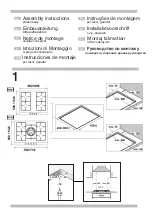
24
�����
�
������
�����
�
������
TECHNICAL INFORMATION
• The installation, adjustments, conversions and
maintenance operations listed in this part must
only be carried out by qualified personnel. The
manufacturer cannot be held responsible for any
damage to persons or property resulting from an
incorrect installation of the appliance.
• The safety and automatic adjustment devices of the
appliances may, during its life, only be modified by
the manufacturer or duly authorised supplier.
• In accordance with the gas standard, the all-gas and
combi appliances are “class 2 subclass 1” (recessed)
an
d, as such, must comply with the clearances
specified in figure 14 and consequently any side
walls must be no higher than th
e work top.
• The walls adjacent to and surrounding the appliances
must be able to withstand an temperature of 95°C.
• The installation of all-gas and combi appliances
must comply with the standards in force.
• This appliance is not connected to a flue for
discharge of the combustion products; therefore, it
must be connected in compliance with the above
mentioned installation rules. Particular attention
must be paid to the instructions given below for
ventilation and aeration.
INSTALLATION
UNPACKING YOUR COOKER
• Once the wrapping has been removed from the outer
surfaces and the various inner parts, thoroughly
check that the appliance is in perfect condition.
If you have any doubts do not use the appliance and
call in a qualified person.
• Some parts mounted on the appliance are protected
by a plastic film. This protection must be removed
before using the appliance. We recommend slitting
the plastic film along the edges with a sharp knife or
pin.
• Do not move the appliance by the handle.
The packaging materials used (cardboard, bags,
polystyrene foam, nails etc.) must not be left anywhere
within easy reach of children as they are a potential
hazard source.
INSTRUCTIONS FOR THE INSTALLER
VENTILATION
The appliance should not be installed in a room of
volume less than 20 m³.
The quantity of air necessary is that required for a
regular combustion of the gas and for the ventilation of
the room. The natural flow of air must be direct through
permanent openings in the walls of the room that open
directly to the outside with a minimum cross section of
100 cm
2
(fig. 15). These openings must be positioned
so they cannot be obstructed.
Indirect ventilation is also allowed by taking air from
adjacent rooms to the one to be ventilated, strictly
complying with the prescriptions of the standards in
force.
LOCATION AND AERATION
Gas cookers must always discharge the products
of combustion and the moisture through hoods
connected to flues or directly to the outside (fig. 16).
If it is impossible to use a hood, a fan installed on
the window or wall, facing the outside, is allowed and
should be switched on each time the appliance is used
(fig. 17) provided the rules and regulations in force
relating to ventilation.
14
Summary of Contents for CCV9D52X
Page 31: ...31 ...









































